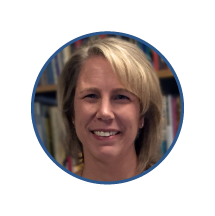|

|
DR. CHRISTINA WOLBRECHT
DECEMBER MEMBER OF THE MONTH
University of Notre Dame
Department of Political Science
Member since 1993
|
WHY DID YOU BECOME A POLITICAL SCIENTIST?
My initial interest in politics was piqued by my extended family, who talked a lot about the things you are not supposed to talk about: politics and religion. I majored in political science in college and wanted to work on political campaigns professionally. I spent Spring semester of my junior year in Washington, D.C., interning part-time for a major political party, an amazing experience that taught me that I like studying politics much more than I like doing politics. As I have advised hundreds of college students since, that was almost certainly the most important thing I learned in college.
WHY DID YOU JOIN APSA AND WHY DO YOU CONTINUE TO STAY INVOLVED?
So much of an academic career takes place beyond the confines of our own classrooms and offices. Both my teaching and research requires I be connected to scholars and their work throughout the U.S. and the world. The APSA—in particular, its journals, conferences, and other programs—is a central means by which I am able to learn from and be in conversation with others in my field and discipline. I could not do my job without those resources and opportunities.
Also I am one of those strange people who enjoys the company of political scientists. APSA conferences are a good place to find them.
WHAT IS THE MOST CHALLENGING ASPECT OF BEING A POLITICAL SCIENTIST? HOW?
I feel incredibly privileged to think and write and teach for a living so I’d start by putting any challenges in that context. One of the best parts about this profession—the considerable discretion and autonomy—can also be one of the most challenging. What research questions will you pursue and how? How will you design your courses, substantively and pedagogically? In my experience, the choices only multiply over time: Collaborate on that research project? Accept that administrative position? Create and direct a new program? Pursue a journal editorship? Serve on that association committee or task force? Every yes is a no to something else, even if we don’t always recognize that trade-off. On an almost daily basis, I find myself asking, Am I putting my time and effort—neither of which I have enough of—into the things that are most important to me?
IF YOU COULD GIVE ONE PIECE OF ADVICE TO SOMEONE IN THEIR GRADUATE/UNDERGRADUATE YEARS, WHAT WOULD IT BE AND WHY?
My advice is about advice. As you are trying to figure out political science—substantively, methodologically, and professionally—talk and listen to as many different people as you can. The work of figuring it out never ends, by the way, or at least it hasn’t for me. I have found broad input helpful at every stage of my career, from applying to and surviving graduate school to the job market, the tenure-track, mid-career, and beyond. I have learned a great deal from both academic superstars and newly-minted PhDs, from my fellow graduate students at one stage and my fellow faculty in my own and other departments at others. Everyone will have a different take but those varied perspectives can help you then figure out what works for you in terms of teaching and research, negotiating the academy, and managing your professional life.
OUTSIDE OF POLITICAL SCIENCE, TELL US SOMETHING INTERESTING ABOUT YOURSELF.
I love old houses. I have stripped more paint than I care to remember and am particularly proud of my ability to take apart a 100-year-old window, re-hang the weights, and reassemble it. These days, we spend more of our time and money on our children then on our old house, but keep a long list of projects and plans for a far off day. My favorite indulgence is reading fiction, rarely deep or
important, usually fun and fantastical. I’d tell the story of how, coming back from an APSA conference several years ago, I missed a flight and was late getting home to my family because I was distracted reading the final Harry Potter…except no one would believe something so ridiculous about a serious scholar such as myself.
